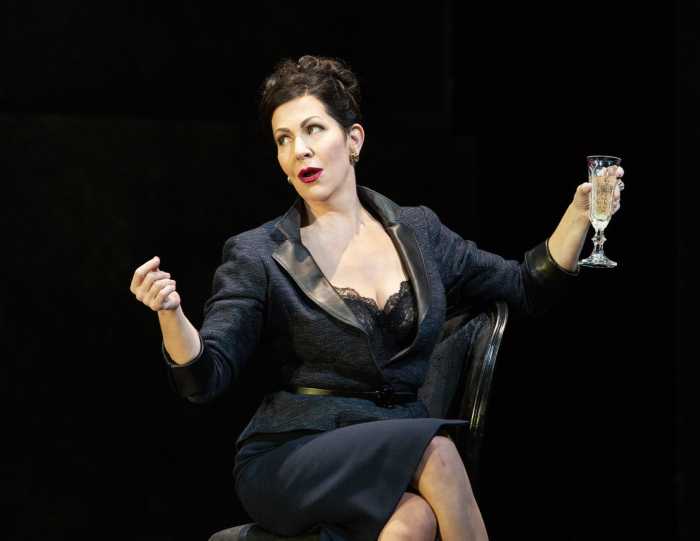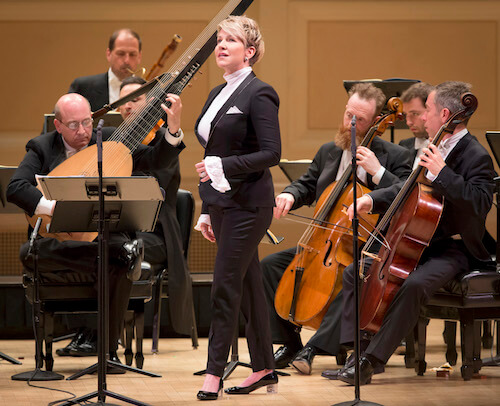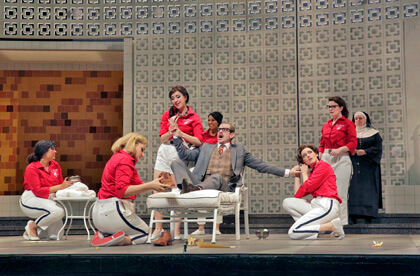The Met’s “Così fan tutte” (February 15) showed the advantages of recasting and reassigning conducting duties in this 2018 staging. Harry Bicket led a sparkling reading with a strong, fully plausible cast. They still had to contend with Phelim McDermott’s good-spirited but way overbusy “Coney Island” production revived by Sara Erde, which has impressive visual values but — from the Overture onwards — upstages the music and story with a 12-person “Skills Ensemble,” some hammy and some rather blank. Too much dancing to the beat and extra-musical noise: both besetting sins of comedies at the Met these days, as if a moment’s stillness would risk losing HD audiences.
As it happens, the afternoon’s most affecting moments were those clear of mugging or (literally) fire-breathing extras. “Per pietà” soared as sung by the very capable Nicole Car: not the most individual of sounds but technically able and far more natural in the role than Amanda Majeski — a good Mozart singer who never seems to hit her stride at the Met — had been. And the slightly narrow-timbred but very pleasing-voiced Ben Bliss, one of two original cast members, aced “Tradito, schernito”. (Why on earth don’t they let Ferrando sing his second aria,”Ah, lo veggio,” the absence of which leaves a perceptible hole onstage?) I liked Serena Malfi’s sparkily feisty Dorabella much more this time around. Broadway star Kelli O’Hara had fared acceptably in her overhyped Met Despina, but Heidi Stober brought a more rounded, penetrating instrument to her music, doing a fine job throughout.
I first heard Luca Pisaroni as a stellar Guglielmo in Turin in 2003. Though his timbre has somewhat dulled, he way outclassed the production’s original Adam Plachetka, both in idiomatic recital delivery and looks (which matter in this part). Hearing Pisaroni and Malfi’s seduction scene provided linguistic specificity rare these days in Mozart anywhere. Gerald Finley may be a bit too elegant a singer for Alfonso, but he gamely sported the Peter Allen-worthy red spangly costume in which the philosopher/ ringleader ends the evening.
Bicket had the cast inserting tasteful decoration, and Jonathan C. Kelly flourished at the harpsichord. Listen to Mozart’s overture before you attend, but this “Cosi’ — playing through March 14 — well merits a visit, and would please opera newbies.
Berlioz’s “Damnation de Faust” — revived by the Met unfortunately not in the drolly inventive Robert Lepage staging but in perfunctory concert form — boasts spectacular stretches but needs visionary conducting to unify its parts. Edward Gardiner’s work February 8 was efficient and even, so that one wished the fine players — oboes especially — were onstage; but no transfiguring magic took hold.
Elina Garanca, dressed to kill and superb in presence (if hardly the story’s vulnerable Marguerite) sang with great beauty and distinction, though a certain froideur always prevails. Ildar Abdrazakov, a genial, sexy Mephistopheles, coped smoothly with his music but might have mustered more verbal bite. Phenomenal French style marked company newcomer Michael Spyres’ work as Faust, though his formidable and often lovely tenor, while unfazed by high C sharps, encountered some uncharacteristic constriction in sustained high passages. One hopes this very individual, accomplished star returns in other roles. Out gay bass-baritone Patrick Carfizzi aced the one-number role of Brander. The men’s and children’s choruses sang strongly; the women did fine save for some edgy climaxes. Perhaps lower pricing for the concert format might have filled the many empty seats?
The revival of Richard Eyre’s reasonably successful 2014 “Le nozze di Figaro,” styled after Jean Renoir’s 1939 film ‘The Rules of the Game,” provided a nice evening in the theater February 5, despite Cornelius Meister’s equivocal conducting: well-textured and allowing for apt decoration from the singers, but with frequent lapses in pit/ stage coordination. One doubts there was sufficient rehearsal.
It’s time for the Met to re-evaluate its constant deployment of Plachetka in Mozart roles. His career started out very well, but his bass-baritone has deteriorated and often emerges rough and undistinguished, and what passed for youthful charm has become lumbering and overdone: Figaro as Ralph Kramden. Soprano Hanna-Elisabeth Mueller — in her third Met role — shares Plachetka’s fundamental plebeian vocal quality, particularly in the middle voice. She’s an apt stylist and a vivid actress, and did her best work where it matters most, in the final “Deh, vieni.” Yet Maureen McKay— the unusually strong Barbarina — would have done more justice to Susanna’s magical music, as would Ying Fang or any number of sopranos on the roster.
The highly stageworthy Anita Hartig didn’t sing her two great arias perfectly — the attractive, very personal tone sometimes turned glassy in the Teresa Stich-Randall manner — but, as the Countess herself says of Cherubino: “Che bella voce!” Neither Almaviva mustered much of a trill, but Étienne Dupuis — looking aptly like a slightly aging but entitled Midwestern congressman — proved a very creditable Count, stylish and unfazed by his aria’s climax. It’s not a distinctive timbre, but he served this role very well. Sparky French mezzo Marianne Crebassa made a smashing debut. The randy page Cherubino, with his audience-pleasing arias and antics, has furnished New Met entrées for many distinguished artists; a short list would include Berganza, Ewing, von Otter, Mentzer, Donose, Kozená, and DiDonato, and Crebassa, with her distinctive, well-modulated, androgynous timbre and keen phrasing, belongs in that company.
Veterans Maurizio Muraro (Basilio) and MaryAnn McCormick (Marcellina) showed more than enough voice for their parts, and the bass gave the evening some genuine italianità. The ever-welcome Keith Jameson’s mercifully uncamped and fluid-voiced Basilio, and Paul Corona (sounding like a Figaro while Plachetka sounded like an Antonio) also added luster to the ensemble.
Rob Howell’s sets are rather cumbersome but his costumes — Hartig really knew how to “work” hers sexily — have great appeal, as does Paule Constable’s lighting. However, the use of space in the crucial comic comings-and-goings of Act IV remains muddled and imprecise, something to rework.
Two conservatory events worth noting. Philadelphia’s Curtis Institute hosted a recital February 16 presenting two 2018 graduates. Evan LeRoy Johnson, now regularly working in Germany, has a terrific tenor of great promise and present musical accomplishment. His time abroad should improve his ability textually to inhabit Schumann Lieder; everything sounded rather operatic, and, though he can sing softly with considerable beauty, he tends to power his way through high phrases. If he controls that, he looks ready for success in several areas of the repertory.
Australian soprano Elena Perroni, showing a darkly Latinate Albanese-like sound unevenly produced, tended to oversell her material facially and physically in the small Field Hall. Once warmed up, she fared best singing heated duets with Johnson from “Manon” and “La bohème.” I wish young sopranos did not feel they need to “do a Netrebko” on Lehár’s “Meine Lippen” and enter through the audience, the equivalent of Pavarotti-style hankie-waving a generation ago.
Lovely Chinese soprano Ziyi Dai, finishing her degree and accepted into Zurich’s prestigious Opernstudio, offered a shimmering “Caro nome” with high-altitude cadenzas: a career to watch.
The indefatigable Danielle Orlando, the director of Vocal Studies and the Curtis Opera Theatre, accompanied the afternoon.
The next night, Juilliard Opera performed Handel’s “Rinaldo”, or at least much of it: the edition Nicholas McGegan presented dropped or reassigned Eustazio’s music, did away with the Magus altogether, and cut a number of arias completely or partially. What there was proved pretty choice, bearing in mind that the gifted singers and instrumentalists are students.
Karin Osbeck’s Rinaldo compensated for rather neutral timbre and insufficiently sharp diction by admirable musicality and phrasing, gathering conviction as she proceeded. In terms of tone and volume, Maggie Reneé Valdman’s aptly androgynous-sounding Goffredo outshone Osbeck, though her technique needs additional refinement as to smooth register breaks. Hyoyoung Kim (Almirena) shone in “Augelletti” and her duets but rather overdecorated the repeats of the fail-safe “Lascia ch’io pianga.”
Fine bass-baritone Erik van Heyningen demonstrated impressive agility in Argante’s macho entrance aria and handled the recits with confidence. Jessica Niles, in full shining voice, really went for Armida, the showy Joan Collins sorceress role, singing superbly except when yielding to the distorted, veristic recit delivery Kate Lindsey has been perversely praised for in “Agrippina” down the street. Song Hee Lee unveiled a beautiful, smooth lyric soprano as a seductive mermaid.
We heard highly impressive continuo playing from Chloe Kim (violin), Kelsey Burnham (recorder) and Jacob Dassa (harpsichord). Ophelie Wolf crafted an effective concert staging; a very pleasant evening.
This summer, Louisa Proske stages this great work at Glimmerglass featuring two terrific rising stars, Allegra De Vita (Rinaldo) and Aryeh Nussbaum Cohen (Goffredo).
David Shengold (shengold@yahoo.com) writes about opera for many venues.



































